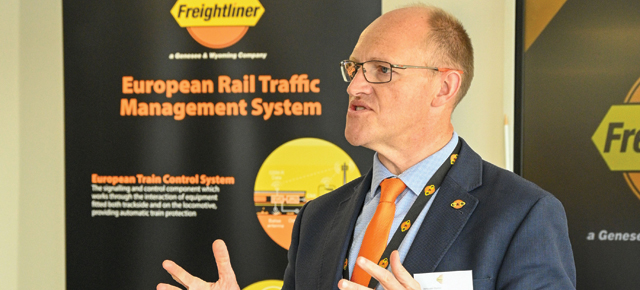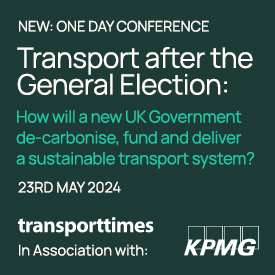Tim Shoveller tells Calling All Stations podcast about the reasons behind his departure from Network Rail last summer to take charge at Freightliner

The railway must unify behind aligned goals and empower its local management. That is the message from Freightliner boss Tim Shoveller, who changed tracks in his career this summer after growing frustrated at Network Rail.
Having devoted his career to the railway, working within both train operating companies and Network Rail, Tim Shoveller was seen by many as a future chief executive of the infrastructure controller. But with government control over the railway tightening further in the wake of the pandemic, he left to become CEO of freight operator Freightliner in July.
Interviewed by transport journalist Christian Wolmar for the Calling All Stations podcast, Shoveller recalled the challenges of trying to bring track and train together in 2012 as managing director of the South West Trains Alliance – a period in which he served as both managing director of Stagecoach’s South West Trains franchise and route director of Network Rail’s Wessex route.
“That was an amazing experience and I lost a lot of hair as a result of that,” said Shoveller.
I very genuinely came the closest I have ever come to really having a breakdown at work
“I very genuinely came the closest I have ever come to really having a breakdown at work.
“A lot of it was pressure I put on myself because I was so determined to demonstrate how a train company and an infrastructure company working together was better. And there was there is not a shred of doubt in my mind that that it was better, and we could just see in our people.”
There were problems, but Shoveller says that these did not stem from delivery on the ground.
He explained: “What had problems was that you had an owner in Network Rail and an owner in Stagecoach, each had completely different objectives.
“I couldn’t have asked for more support from Robin Gisby in Network Rail or from Martin Griffiths in Stagecoach, but fundamentally what the alliance couldn’t resolve is that the shareholders had completely different objectives that were set by different organisations.
“Everyone’s trying to do the right thing. South West Trains is trying to do the right thing … But everyone had slightly different objectives and those objectives are mismatched. And when you do that, of course, it takes a very long time to achieve something which is actually quite simple.
“That’s the root cause of the problem we’ve got with our railways today.”
Shoveller’s last role with Network Rail was as managing director of its North West & Central region. He learnt a lot from Network Rail chairman Lord Hendy of Richmond Hill and chief executive Andrew Haines, and he was excited at the plans to bring track and train together under the single guiding mind of Great British Railways. But he was growing frustrated in an environment, post-Covid, where increased government oversight meant that the ability to implement urgent things “was effectively zero”.
While acknowledging the need for the government to ensure that value for money is derived from additional funding, the problem is that “it slows everything down”.
“You need to invest power in your frontline teams because they know how the railway runs,” he argued. “They know how to make it better. They know where it’s going wrong … And of course what we’ve seen was that power and authority being removed because ultimately, of course, levels of governance became much higher.”
I need to be excited, I need to motivate myself and I was getting frustrated
He concluded that it was time to seek a new challenge: “I was excited about what I was hoping I would be able to achieve had GBR come about. I could see that was going to be several years away … I need to be excited, I need to motivate myself and I was getting frustrated.”
Shoveller was immediately energised by his new role, but he remains optimistic about the future of the wider rail industry.
“The need for the railway, I think, is greater than ever,” he said. “The climate emergency moves the railway’s ability to move lots of people in a carbon friendly way or lots of goods in a carbon friendly way from being a nice thing to have to must-have.
“As a society we need that. We need to maximise its capacity and its potential and we won’t get that if we just have a whole series of random structures that are that are incapable of working efficiently with each other.”
Listen to Calling All Stations with Christian Wolmar, Mark Walker and guests on podbean.com
This article appears in the latest issue of Passenger Transport.
DON’T MISS OUT – GET YOUR COPY! – click here to subscribe!









